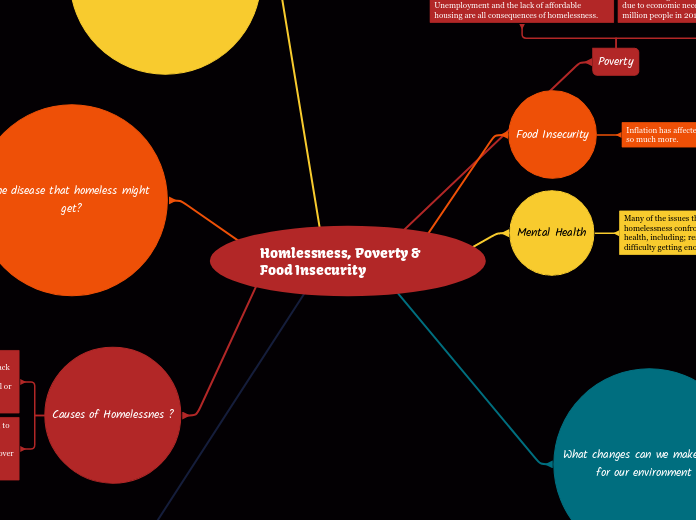Homlessness, Poverty & Food Insecurity
Poverty
Unemployment and the lack of affordable housing are all consequences of homelessness.
The number of people who have lost their home and are living doubled up with family or friends due to economic necessity remained at 7.4 million people in 2012.
Food Insecurity
Inflation has affected the prices for grocery and so much more.
Mental Health
Many of the issues that persons experiencing homelessness confront can aggravate their health, including; restricted access to health care, difficulty getting enough food.
What changes can we make better for our environment ?
some examples are Changing the economic , social, or physical surroundings or contexts that affect the health outcomes.
To better our living and their living as well,we should host food bank to our located church and giving out each month food, and necesites for them.
What are some risks that apply to homelessness?
The risks are the difficulty staying safe, violence, stress, unsanitary housing conditions and the exposure to the harsh weather.
The disease that homeless might get?
HIV, lung disease and hunger and mental health and substance use issues and wounds and skin infections are all major health issues among homeless persons
Due to homeless people they can’t receive medical care due to their income status and they might not have insurance.
Causes of Homelessnes ?
We also need to understand the underlying causes of homeslessness which can include; lack of affordable housing, unemployment, metal health issues, substance abuse such as alcohol or drugs or criminal backgrounds that deny the possibility of employment.
In the year of 2008, recession an estimate 2.5 to 3 million men, women and Children were experiencing homelessness each year and including a total of 1.35 million children and over a million people working full or part time but unable to pay for housing.
More Info
Most families are living paycheck to paycheck with this society that we are living in.
The National Law center on homelessness & poverty currently estimates that each year at least 2.5 to 3.5 million Americans sleep in shelters, transitional housing, and public places not meant for human habitation.
